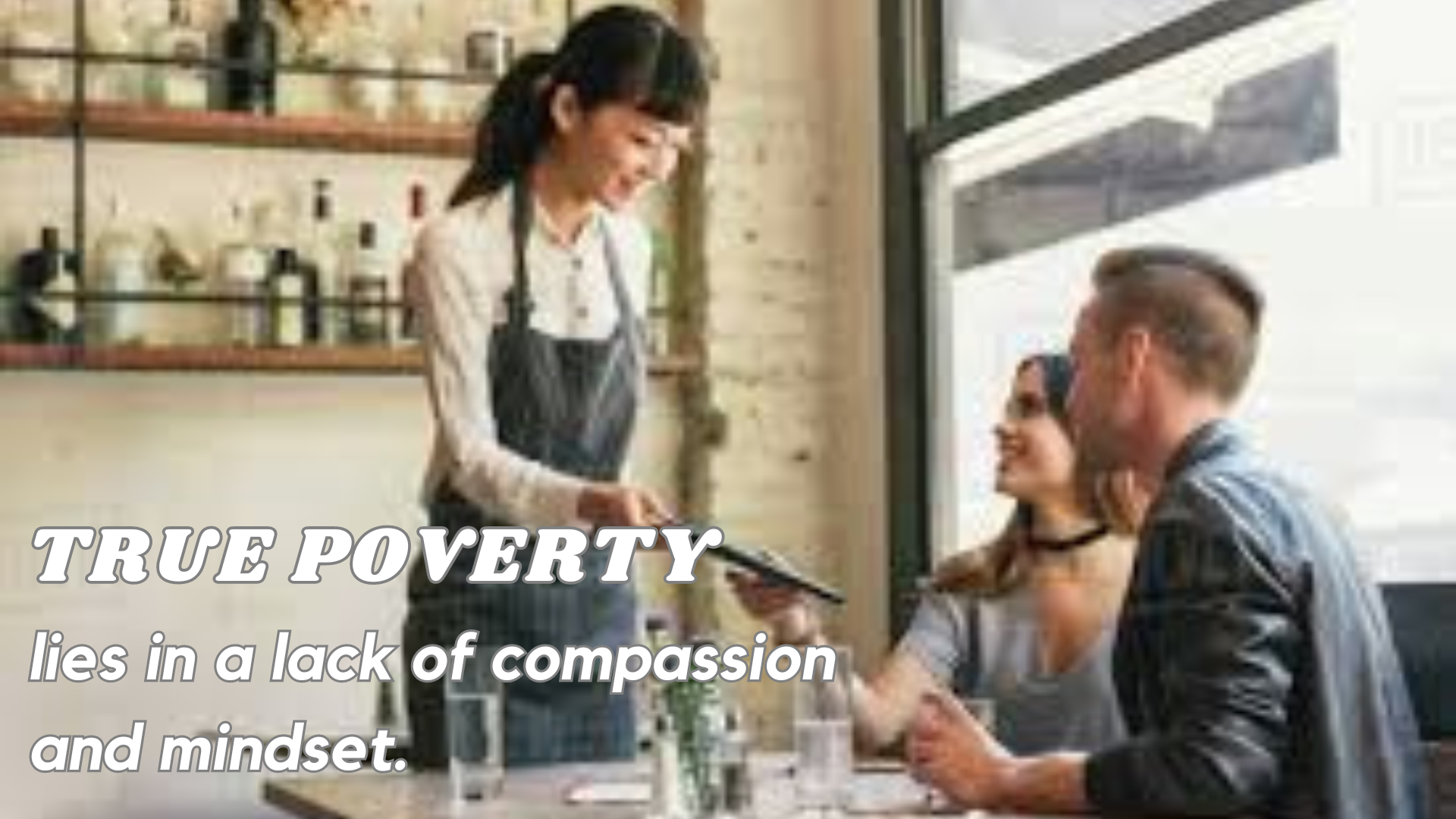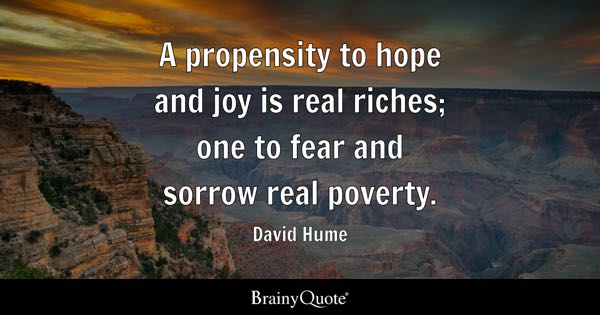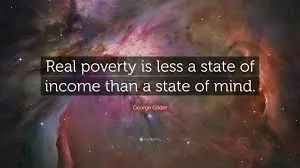Welcome to (International Stories). In this story, we will discuss True poverty lies in a lack of compassion and mindset. I hope you will like this story and understand it.
True poverty lies in a lack of compassion and mindset.
An American waiter handed a guy and his wife an eating menu, but before they could peruse it, they ordered her to serve them the two cheapest meals because they didn’t have enough money. Salaries have not been received for many months. They are therefore going through a difficult period.
Waitress Sarah didn’t think long. He suggested two dishes to them and they agreed without hesitation that they were the cheapest. She brought both orders and they ate quickly out of hunger, and asked the waitress for the bill before leaving. She returned to him with a slip of paper in her billing wallet on which she had written: “I have paid your bill from my personal account considering your circumstances.
This is a gift from me.” It’s a hundred dollars, and that’s the least I can do for you. Signed by Sarah.
As they left the restaurant, both of them was pleased.
What was surprising for the embattled Sarah was that she was more than happy to pay the couple’s dinner bill despite her tight financial situation.
Although she had been saving money to buy an automatic washing machine for about a year as she found it very difficult to wash clothes with the old washing machine.
But what hurt her the most was that Sara’s friend scolded her when her friend found out about the affair. Because she had saved this money by neglecting her own and her child’s needs, she needed to buy a washing machine for herself more than to help others.
Meanwhile, she received a phone call from her mother who said to her in a loud voice: “Sarah what have you done?”
He answered, “I have done nothing,” in a low, tremulous voice, terrified of an excruciating shock. How did that come about?”
In response, his mother said, “Facebook is bringing heaven and earth together to celebrate you and your actions.
This guy and his wife posted your message on Facebook when you paid the bill on their behalf. And many people shared it. I’m proud of you.” …
He had barely finished his conversation with his mother when a friend from school called him to reveal that his message had gone viral on all digital social platforms.
As soon as Sarah opened her Facebook account, she received hundreds of messages from television producers and press reporters asking to meet with her to discuss her particular initiative.
The next day, Sarah appeared on one of the most popular and most watched American television shows. The presenter gave her a $10,000 check, a contemporary television, and an opulent washing machine.
Received a five thousand dollar purchase voucher from an electronics company. He was showered with gifts until the amount received in appreciation of his great humanitarian behavior reached over $100,000.
Two meals that cost no more than a few dollars + $100 changed his life.
Generosity is not giving away what you don’t need, but giving away what you need to someone else in need.
True poverty lies in a lack of compassion and mindset.
Why do we need to be aware of poverty?
Being aware of poverty is crucial for several reasons, as it impacts individuals, communities, and societies as a whole. Here are key reasons why awareness of poverty is important:
Empathy and Compassion
Awareness of poverty fosters empathy and compassion. Understanding the struggles of those living in poverty helps us develop a deeper connection to others and encourages us to support and assist those in need. This awareness can inspire acts of kindness and generosity, as seen in the story of Sarah.
Addressing Inequality
Poverty is often a result of systemic inequalities, including unequal access to education, healthcare, and economic opportunities. Being aware of poverty helps highlight these disparities and can drive efforts to address and reduce inequality at local, national, and global levels.
Promoting Social Justice
Awareness of poverty is essential for promoting social justice. It encourages us to advocate for policies and programs that provide support to those who are disadvantaged and ensure that everyone has access to basic needs and opportunities.
Informed Decision-Making
Understanding the root causes and consequences of poverty allows individuals, communities, and governments to make informed decisions when it comes to resource allocation, policy development, and charitable giving. This awareness can lead to more effective solutions that address the underlying issues of poverty.
Encouraging Community and Global Engagement
Being aware of poverty encourages people to engage in their communities and take action, whether through volunteering, advocacy, or supporting organizations that work to alleviate poverty. On a global scale, it fosters a sense of responsibility to contribute to efforts aimed at reducing poverty and improving living conditions worldwide.
Breaking the Cycle of Poverty
Awareness helps identify and address the factors that contribute to the cycle of poverty, such as lack of education, limited access to healthcare, and economic instability. By understanding these factors, we can work to create opportunities that empower individuals and families to break out of poverty.
Building a More Equitable Society
Awareness of poverty challenges us to reflect on the values of fairness and equity. It motivates us to work towards a society where everyone has the opportunity to thrive, regardless of their socioeconomic background. This awareness is crucial for building a society that values and supports all its members
Global Impact
Poverty is a global issue that affects millions of people. Being aware of its impact on a global scale helps us understand how interconnected we are and how issues like poverty can influence global stability, migration, and economic development. This awareness can drive international cooperation and aid efforts to combat poverty worldwide.
Personal Growth and Perspective
Being aware of poverty can lead to personal growth by expanding our perspective on life. It reminds us of the privileges we may take for granted and encourages us to be more grateful, humble, and socially responsible. It also challenges us to think critically about the world we live in and our role in making it better.
Moral and Ethical Responsibility
Many people believe that we have a moral and ethical responsibility to help those in need. Awareness of poverty can motivate us to fulfill this responsibility by taking action to support those who are less fortunate, whether through charitable giving, volunteering, or advocating for change.
CONCLUSION:
The story of Sarah, the waitress, beautifully illustrates the transformative power of compassion and generosity. Despite facing her own financial challenges, Sarah selflessly paid for a couple’s meal at the restaurant, an act that went viral on social media and brought her unexpected rewards.
This narrative emphasizes that true poverty isn’t just about material lack but can also stem from a scarcity of compassion and a narrow mindset. Sarah’s action not only helped the couple in need but also inspired countless others, leading to an outpouring of support and recognition. It underscores the profound impact that small acts of kindness can have on individuals and society as a whole.
FAQ:
What does this story teach us about generosity?
The story illustrates that true generosity involves giving even when it may be difficult or when the giver may also be in need. It’s about recognizing and acting on the needs of others, even if it requires personal sacrifice. Sarah’s decision to help the couple, despite her own financial struggles, shows that generosity is more about intention and compassion than the actual amount given.
Why is compassion important in our daily lives?
Compassion drives us to connect with others and respond to their needs with empathy and kindness. It fosters a sense of community and mutual support, which is essential for a healthy society. In Sarah’s case, her compassion not only helped the couple but also inspired others, leading to a wave of support and recognition for her act.
How does the story challenge the traditional view of poverty?
The story suggests that poverty is not just a lack of material wealth but can also be a lack of compassion and an open mindset. While Sarah was not financially well-off, her rich spirit and willingness to help others show that true wealth comes from the heart.
What role does social media play in spreading positive actions?
Social media can amplify positive actions and inspire others to do good. In the story, Sarah’s act of kindness went viral, leading to widespread recognition and support. This demonstrates how one small act can have a far-reaching impact, encouraging a culture of generosity and compassion.
How does this story illustrate the concept of “paying it forward”?
Sarah’s act of kindness towards the couple can be seen as a form of “paying it forward,” where her generosity sparked a chain reaction of kindness and support from others. This highlights how acts of generosity can create a ripple effect, leading to more positive actions in the community.
What moral lessons can be drawn from Sarah’s story?
The story teaches that moral integrity and compassion are invaluable. It also highlights the importance of selflessness and the belief that helping others, even when it’s not easy, is a virtuous and rewarding act. Additionally, it shows that moral actions are often recognized and rewarded, sometimes in unexpected ways.
Can generosity and kindness be taught, or are they innate qualities?
While some people may naturally be more inclined towards generosity and kindness, these qualities can also be nurtured and encouraged through life experiences, upbringing, and societal influence. Sarah’s story can serve as an example to others, showing that anyone can choose to be kind and generous, regardless of their circumstances.
How does the story define true wealth?
True wealth in this story is defined not by material possessions or money but by the richness of character, compassion, and the willingness to help others. Sarah’s inner wealth, despite her financial struggles, ultimately leads to her being recognized and rewarded in a much greater way than she could have imagined.



Just wish to say your article is as surprising The clearness in your post is just cool and i could assume youre an expert on this subject Fine with your permission allow me to grab your RSS feed to keep updated with forthcoming post Thanks a million and please keep up the enjoyable work
Fourweekmba Good post! We will be linking to this particularly great post on our site. Keep up the great writing
Can I just say what a relief to find someone who actually knows what theyre talking about on the internet. You definitely know how to bring an issue to light and make it important. More people need to read this and understand this side of the story. I cant believe youre not more popular because you definitely have the gift.
Hi Neat post Theres an issue together with your web site in internet explorer may test this IE still is the marketplace chief and a good component of people will pass over your fantastic writing due to this problem
I was suggested this web site by my cousin Im not sure whether this post is written by him as no one else know such detailed about my trouble You are incredible Thanks
Best article I hope we should follow this and also sharing a good content
Excellent blog! Do you have any helpful hints for aspiring writers? I’m hoping to start my own blog soon but I’m a little lost on everything. Would you suggest starting with a free platform like WordPress or go for a paid option? There are so many options out there that I’m completely overwhelmed .. Any ideas? Thanks!
Can you be more specific about the content of your article? After reading it, I still have some doubts. Hope you can help me.
Hey there! Do you know if they make any plugins to assist with SEO?
I’m trying to get my blog to rank for some targeted keywords
but I’m not seeing very good results. If you know of any please share.
Thank you! I saw similar article here: Bij nl
Normally I don’t read post on blogs, but I wish to say that this write-up very forced me to try and do it! Your writing style has been amazed me. Thanks, quite nice article.